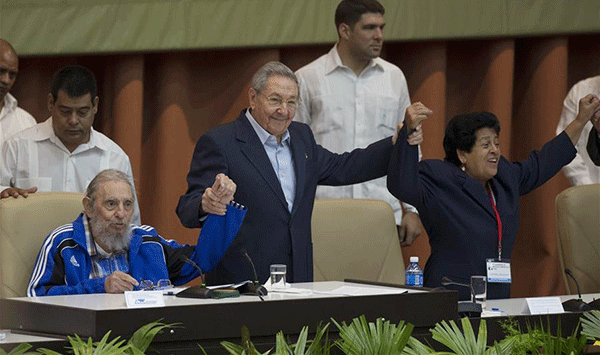Ties established by Castro will continue
 |
|
File photo taken on April 19, 2016 shows Fidel Castro (L, Front) and Raul Castro (C, Front) attending 7th Congress of the Communist Party of Cuba, in Havana, Cuba. Cuban revolutionary leader Fidel Castro died on Nov 25, 2016 at the age of 90, said his brother Raul, the current leader of Cuba. [Photo/Xinhua] |
The death of Cuban leader Fidel Castro on Friday has prompted many to reflect on his impact on the world.
Praising Castro as "a great figure of our times", President Xi Jinping said the Chinese people have lost a "close comrade and sincere friend". Extending his condolence to Cuban President Raul Castro, Premier Li Keqiang hailed him as "the founder, defender and propeller of China-Cuba ties".
In the Cuban capital of Havana, people from all walks of life took to the streets to pay tribute to the leader of the Cuban revolution and founder of the Cuban Communist Party.
Under his charismatic leadership, which lasted nearly half a century, Cuba became an example of a country with limited geopolitical power influencing international relations, which normally are dominated by big players. He did not stop fighting to get his country its rightful place in the global arena until 2006, when he stepped down as Cuban president for health reasons. Two years later, he officially passed the baton to his brother Raul Castro.
By establishing the first socialist country in the Western hemisphere after the revolution in 1959, Fidel Castro led the Cuban people on a path that few had even tried to tread on.
His first big test as Cuba's leader came during the missile crisis in 1962 when the world was on the brink of a nuclear war between the United States and the Soviet Union. In the late 1970s and 1980s, he sent Cuban troops to some African countries to strengthen their liberation struggles.
Fidel Castro was also a steadfast champion of regional integration mechanisms, including the Bolivarian Alliance for the Peoples of Our America and the Petrocaribe energy alliance, under which Cuba's medical, educational and sports personnel have worked in more than 120 countries. He also helped strengthen the Non-Aligned Movement, especially when he was its secretary general from 1979 to 1983.
After five decades of struggle to advance its socialist cause and promote revolutionary ideas worldwide, the island state remains steady on its course thanks to the substantial progress it has made in the fields of education, medical services and economy.
There is little doubt that his legacy extends beyond the Caribbean, as the socialist movements in Latin America and developments in international relations show.
The future of Washington-Havana relations seem uncertain, because not much progress has been made after the US restored diplomatic ties with Cuba last year. Despite their geopolitical proximity and the vast gap in their economic and strategic might, however, Cuba did not give in to the US' more than half a century economic sanctions. US-Cuba diplomatic ties may have been restored because of Washington's softened stance on Latin American affairs and Havana's diplomatic maneuverings in the past decades. But the bitter remarks made by US president-elect Donald Trump on Castro's legacy on Saturday has cast a shadow over the already fragile ties.
However, the time-honored China-Cuba friendship will continue. Back in 1960, Cuba was the first nation in the Western hemisphere to forge diplomatic relations with China, and the two nations share more than their adherence to the socialist cause. Both countries have enjoyed the constantly improving economic exchanges, and are expected to expand their cooperation as Cuba presses ahead with economic reforms.
The author is a researcher in Latin American studies at the Chinese Academy of Social Sciences.




















